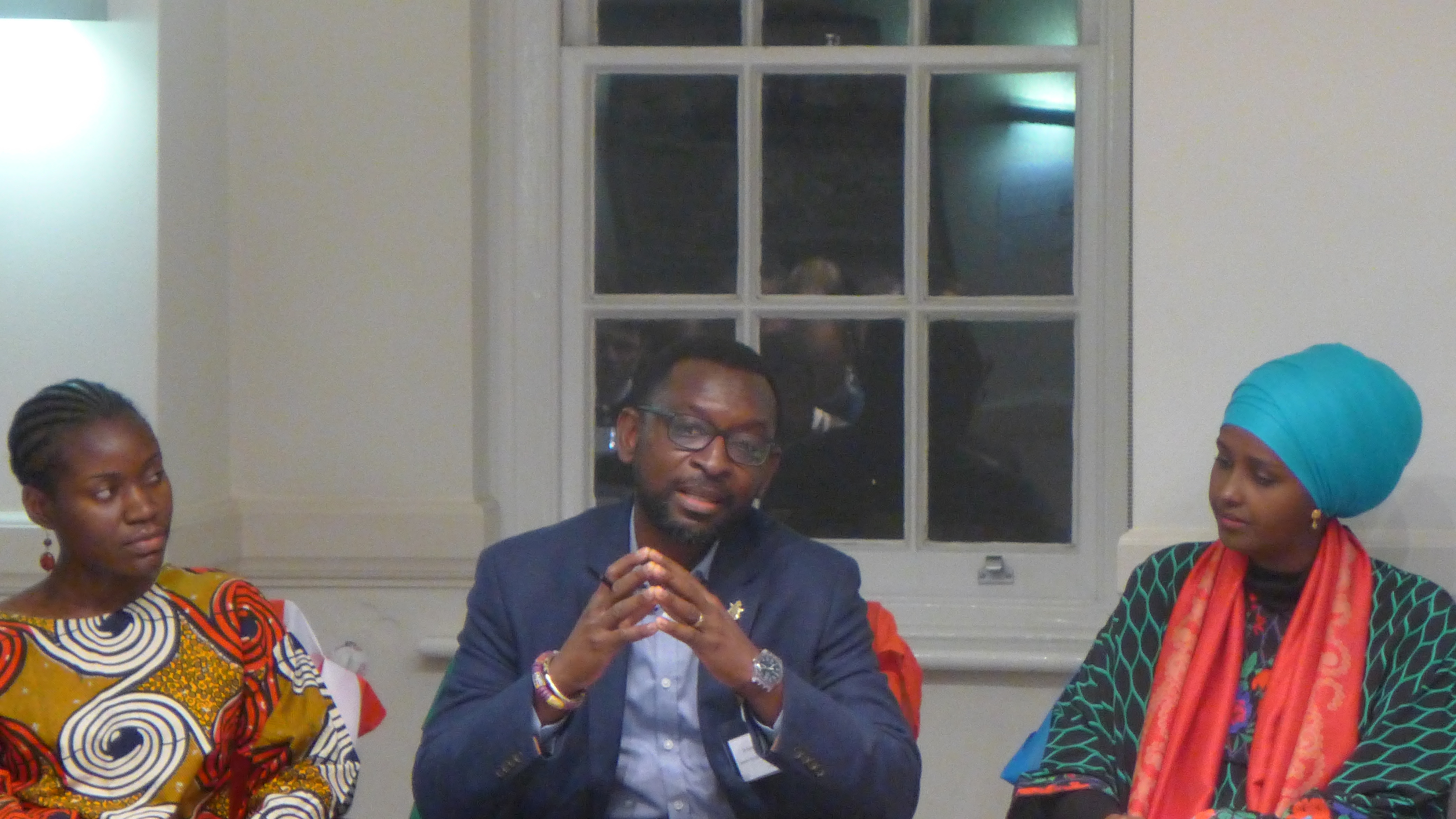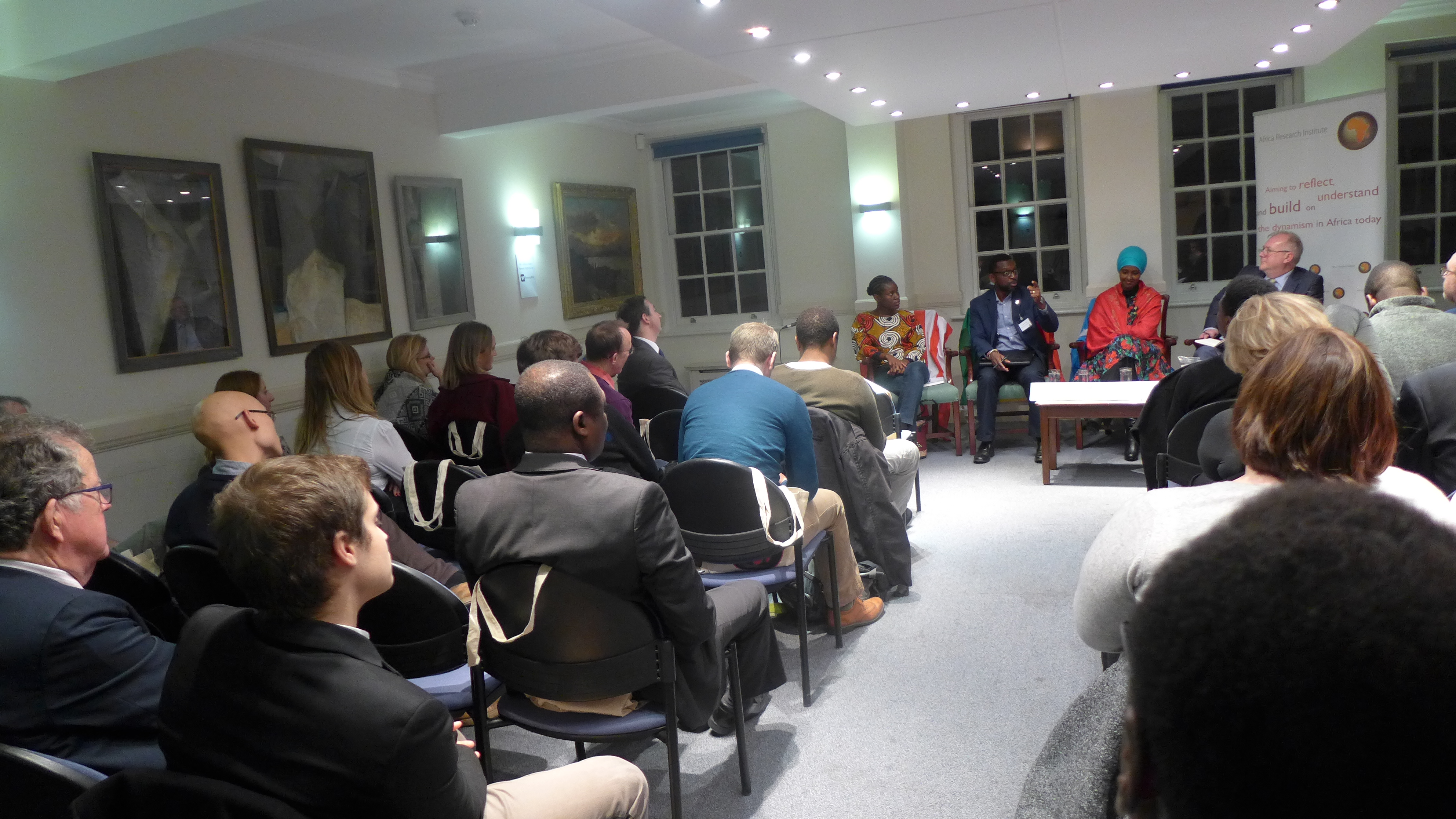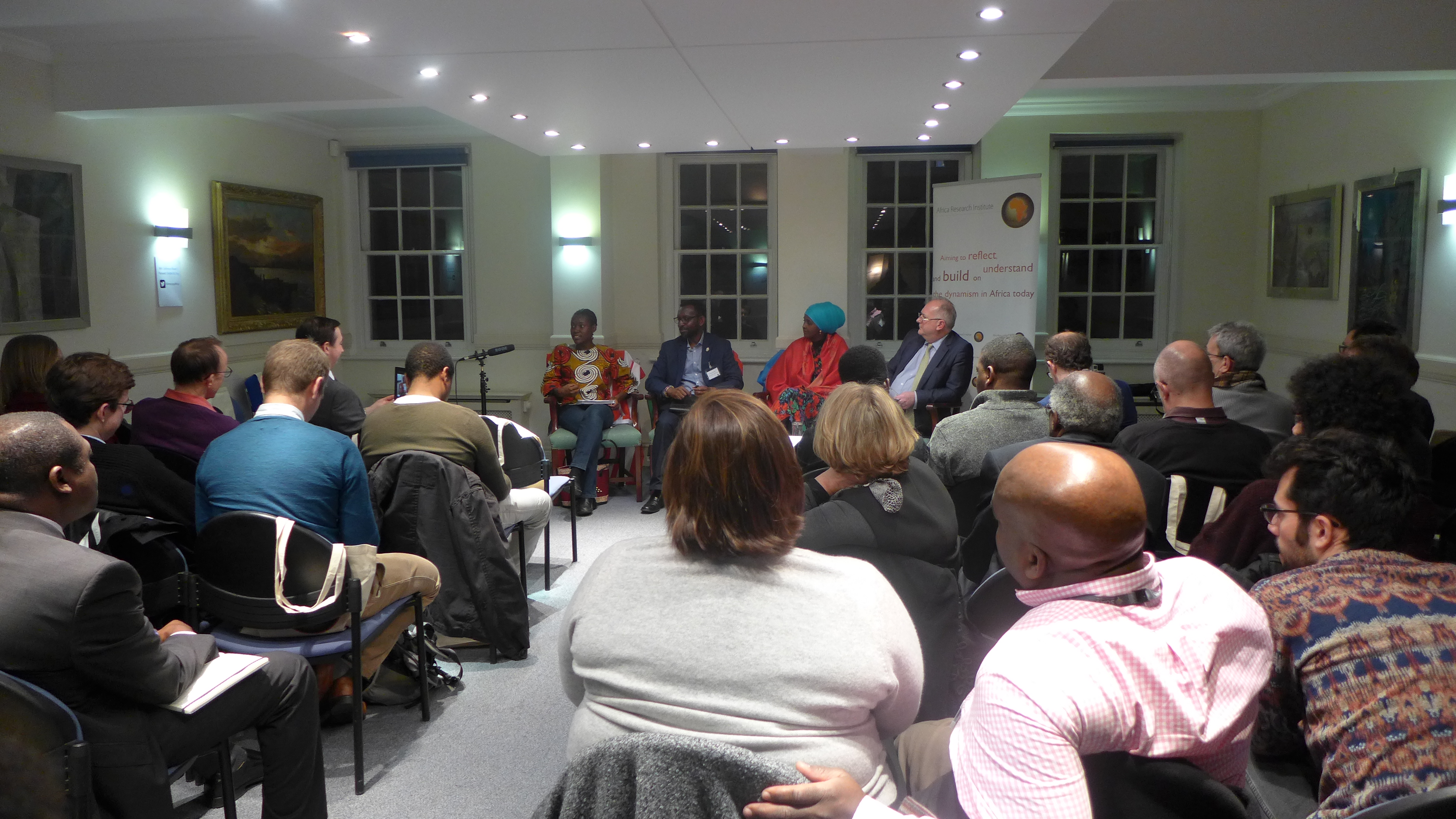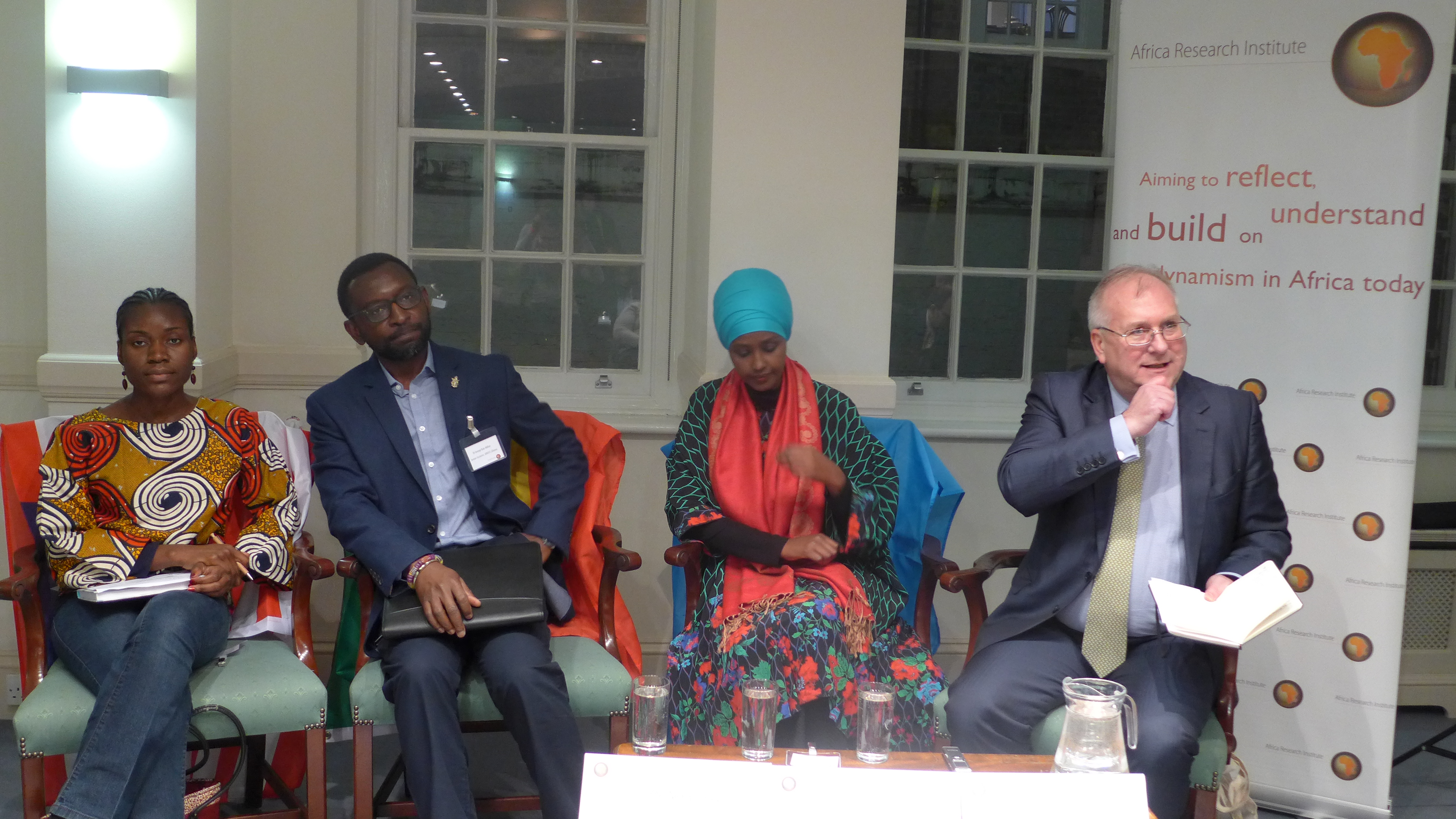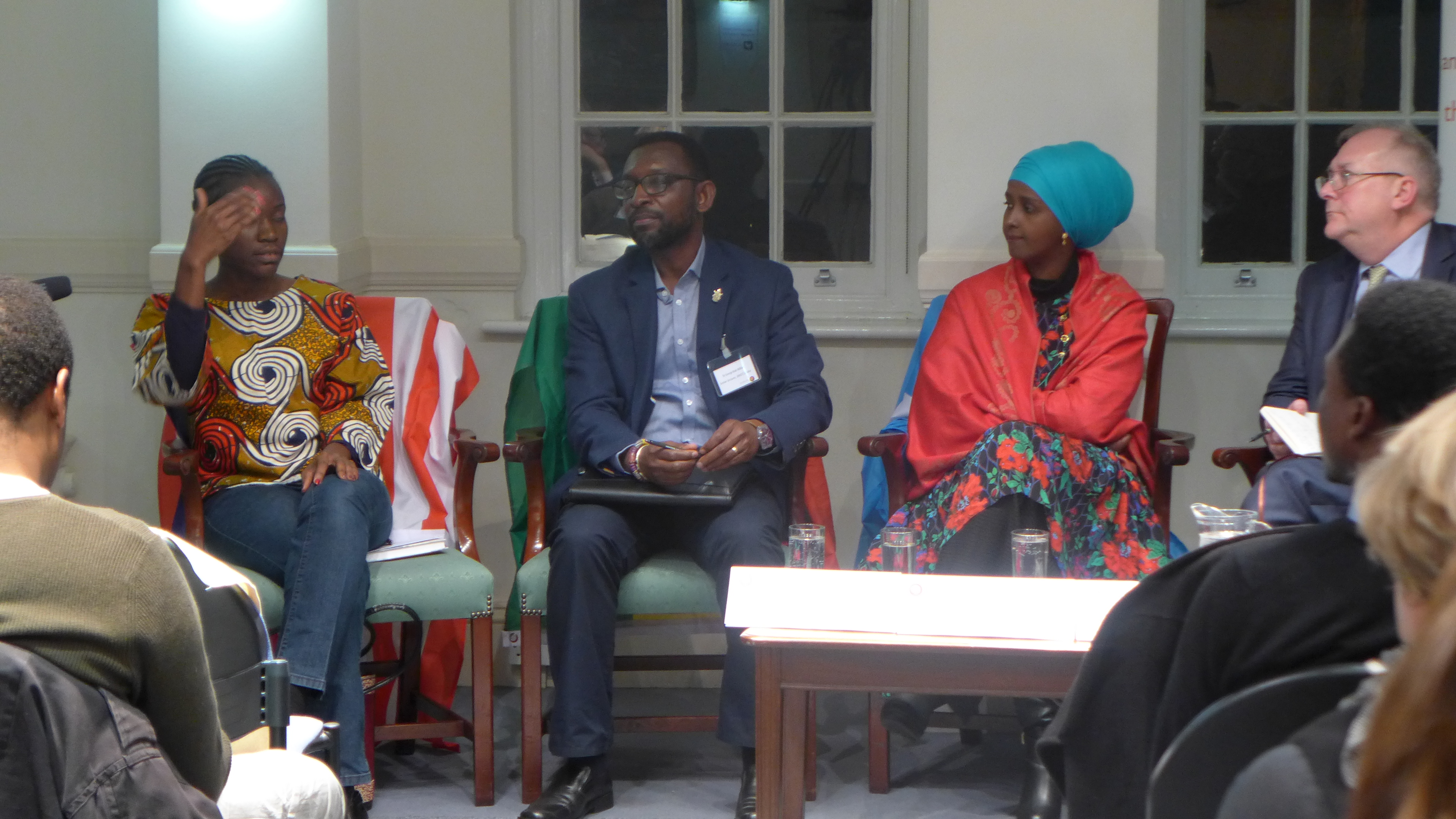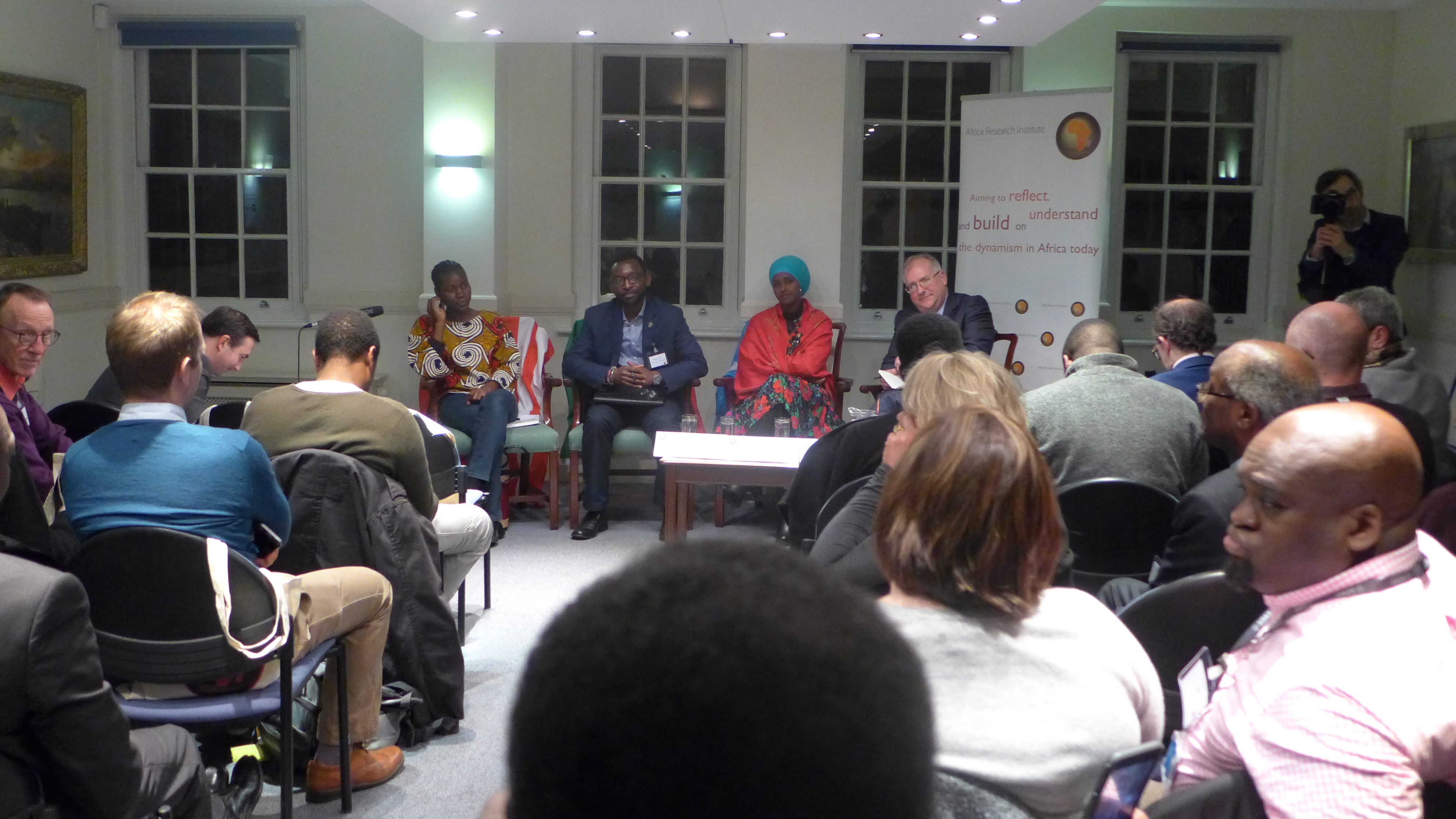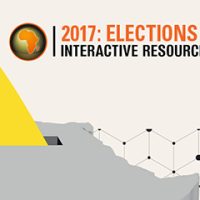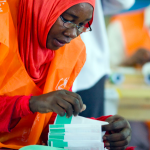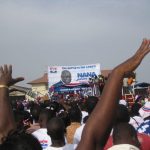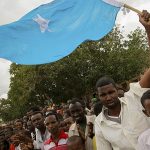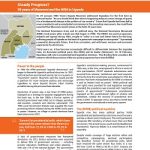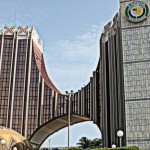On Monday 30 January 2017 we were joined by three speakers to discuss the state of democracy in Africa. The event also launched ARI’s interactive elections resource for 2017.
Fadumo Dayib – former presidential candidate and anti-corruption activist – Somalia
- Decision to run: I was always aware that we needed change in Somalia, but I thought that it would come from elsewhere, or from someone else. However, after waiting for almost 26 years, I realised that maybe I could be that person. In September 2014 I decided to declare my candidacy for president. I knew that from that moment my life would never be the same again.
- My experience as a woman: We have a proverb in Somalia that a woman’s place is either at home or in the grave. I was trying to negotiate a space between the two and some people were adamant that it would expedite my journey to the grave. I received a lot of death threats; an experience not shared by the male candidates in the race. These threats were very specific and on some occasions targeted my children. This was shocking and traumatising for me as a mother, knowing that what I was doing was going to impact on my children and perhaps put them at risk. Despite the threats I do not regret coming forward.
- Corruption: Corruption was the biggest challenge. Whenever I spoke to people in politics or power the first thing they would ask was “What do you have for us?”, “How much money do you have?” or “How much can you pay?” They were not interested in my vision for Somalia. This was very frustrating. How can you come into elected office through unconstitutional means and then demand that the citizens adhere to the rule of law when you yourself have not done so?
- Clan system: I declared my candidacy with the understanding that Somalia’s elections were going to take place under a one-person-one-vote system. However, 18 months later the government reverted back to the 4.5 clan-based system. This formula segregates Somalis in a way that is akin to apartheid. It supports the notion that the four major clans are ethnically pure, while the remainder – the 0.5 – are marginalised. It is unconstitutional.
- Towards 2020: In 2020, when we will hopefully have democratic elections, I will be running again. I truly believe 12 million Somalis deserve peace, dignity, prosperity and leaders who walk the talk and set a good example. Until then I will work independently in civil society to promote transparency and human rights, to make sure that we begin the process of bringing democratic accountability to Somalia.
George Bob-Milliar – senior lecturer at Kwame Nkrumah University of Science and Technology – Ghana
- A model for the continent? 28 August 2013 was the day nine Supreme Court justices returned their verdict on an electoral petition raised by the opposition New Patriotic Party (NPP) about the conduct of the previous year’s election. In the preceding eight months, Ghanaians had been hooked, watching or listening to the litigation in court. At the end we were all convinced that there was something wrong with our electoral system. For example, it became obvious that there were systematic discrepancies between the results being returned at polling centres and those being returned at collation centres. This was happening on both sides of the political spectrum and it was clear these practices been going on in previous elections. The Supreme Court’s report exposed the myth that Ghana’s democracy was a model for the rest of Africa.
- Key campaign issues: The 2016 election was the first time that a sitting incumbent has lost an election in Ghana. Some commentators said that although John Mahama had served only one elected term his party had been in power for eight years, and that this historically has always resulted in a party being ousted. However, poor electricity supply and rising costs, a lack of job opportunities for young people and rising inflation meant that it was largely the economy that put paid to Mahama’s bid for a second elected term. Social welfare – the lack thereof – was also an important campaign issue. During their time in power the National Democratic Congress (NDC) invested a lot in infrastructural development, but they failed to address the welfare components of those structures; people still could not afford or access health insurance. The NPP campaigned to improve social welfare provision and on a promise to radically transform Ghana’s economy through industrialisation. But their election promise of setting up factories in all 271 districts in the country may prove difficult to deliver.
- State capture: In Ghana, whenever there is transition between the NPP and NDC, party footsoldiers view it as a coup d’état. Transition is improving at the level of national politics, but at the grassroots there is still a very strong winner-takes-all mentality. People see anything that is associated with the state as being owned by the party in power, and in the aftermath of elections in which power changes hands these footsoldiers seize control of state assets like public toilets and road toll booths. This way they ensure the revenue collected goes directly to themselves and not to central government.
- Room for improvement: Ghana has successfully consolidated its electoral democracy, but it is not perfect. Several challenges remain: the legislature is weak, the judiciary has problems and the economy is not producing the dividends that democracy was expected to bring.
Robtel Neajai Pailey – Liberian academic, activist and author
- Pseudo-incumbency: October’s election will be the first democratic transition in Liberia between two heads of state in recent memory. There will be no incumbent in this election as President Ellen Johnson Sirleaf will step aside having served her constitutionally allotted 12 years. But Vice-President Joseph Boakai is almost a “pseudo-incumbent”. Being in a position of power, he has access to state resources that can be employed to give him an edge over his rivals.
- New faces: There are a lot of the usual suspects – the seasoned politicians – who will run for the presidency, but what is fascinating is the number of new aspirants with more technocratic or entrepreneurial backgrounds. These include Alex Cummings, the former chief administrative officer at Coca-Cola; Mills Jones, the former Governor of the Central Bank; and John Morlu, the former Auditor General, who is a viewed as an anti-corruption “messiah” in many parts of the country. So far these candidates have shown signs they can gather support in urban and rural areas. The 2017 election is shaping up to be an issues race in Liberia – it is not about the cult of the personality. Voters are asking questions like “What is your track record?”, “What have you actually delivered in the last 6-12 years?”, and “Why should we trust you?”
- Coalition building: Several political party leaders have realised that they cannot win this election in the first round. Coalition-building is necessary and at the moment the most powerful looks to be the Coalition for Democratic Change (CDC), fronted by George Weah with Jewel Howard Taylor as his running mate. The CDC promises to be a “hot ticket” as it brings together voters from outside their respective ethno-regional bases and the early indications are that it can do well in areas won by Johnson Sirleaf in 2011 that are less supportive of her Unity Party successor, Joseph Boakai.
- Law enforcement: The enforcement of certain laws, or lack thereof, will be worth keeping an eye on. First, a residency clause explicitly states that if you have not resided in Liberia for ten consecutive years you are not eligible to run for president. This clause was not applied in the 2011 election, but a decision taken then by Supreme Court promised that it would be in 2017. There has not been much discussion about it so far, but if it does come up it may cause problems for the candidatures of Alex Cummings and John Morlu. Secondly, Liberia does not recognise dual citizenship. The suggestion is that several of the candidates, including Weah, who stood in 2011, would be affected if this is enforced. Finally, in 2014 a civil service code of conduct law was introduced that states anyone who is intending to run for elected office, either in the legislature or the presidency, must resign two years before the polls. There are a number of people vying for the presidency and seats in the House of Representatives who have not done so. If these three laws are raised and discussed it could lead to a constitutional quagmire.
- Women in politics: In 2006, just after Sirleaf was elected president she had five women with strong technocratic qualifications in her cabinet. There were five female superintendents, who represent the president in the 15 counties, and 13 female senators. In 2017, there are only two superintendents, three senators and three women in the cabinet. Of those cabinet officials one is the gender minister, which is a bit tokenistic, and the other heads up the National Investment Commission, a non-ministerial position.
- Sirleaf’s mixed legacy for women: Efforts to improve equality have struggled to make progress in the political sphere. A Gender Equity in Politics Bill put forward by the women’s legislative caucus in 2010 proposed a quota system, but Sirleaf was noticeably silent on it initially; even when she did express support, it was with no great enthusiasm. The bill was not passed and the fact that a female president would not openly champion a measure to give women an edge has filtered down to voters and shaped their attitudes against the need for these types of measures in the future. On a more positive note, Sirleaf, at least initially, tried to bring a lot of younger women into her political inner circle and she has done a great job improving market women’s access to entrepreneurial opportunities, in particular, and supporting efforts to improve financial autonomy. But whilst in the economic sphere there has been progress, in the political sphere Sirleaf has not done enough. The question a lot of young Liberian women are asking is “What about us?” “Is the glass ceiling so high that our president, who is a woman, has not completely shattered it?” “If so, why not?”
Podcast
Video:
Photos:
